NAVA opposes AI exceptions in Productivity Commission submission
NAVA warns AI copyright exception idea threatens livelihoods and Indigenous Cultural and Intellectual Property.
NAVA warns AI copyright exception idea threatens livelihoods and Indigenous Cultural and Intellectual Property.

With artificial intelligence (AI) developing so quickly, NAVA is standing up for the intellectual property rights and income-generating potential of visual artists, craft practitioners and designers. We are deeply concerned that artists’ works are being used in AI without permission, payment or respect for their rights.
In our submission to the Productivity Commission’s Harnessing Data and Digital Technology interim report, NAVA raises strong opposition to the idea of introducing a fair dealing exception for text and data mining (TDM) into the Copyright Act. While the Commission has floated this concept for discussion, NAVA warns it would entrench a system where creators are not asked, not paid, and not protected. It would primarily benefit large multinational AI companies while causing long-term harm to Australia’s creative industries, including the visual arts. Far from promoting innovation, it would further worsen the precarity already experienced by many artists.
The risks are especially severe for Indigenous Cultural and Intellectual Property (ICIP), which is not protected under current copyright law. Weakening copyright to facilitate AI scraping would disproportionately impact Aboriginal and Torres Strait Islander artists. It would lead to the misappropriation of cultural expressions, loss of control over ICIP, further risks to Indigenous data sovereignty, and the increase of AI-generated “Aboriginal-style” outputs that distort markets and disrespect culture. As the Indigenous Art Code and the Productivity Commission’s own earlier report on Indigenous visual arts note, dedicated legal protections are urgently needed.
NAVA’s July 2025 national survey of more than 890 artists found that over 80% believe AI poses risks to their income, practice and moral rights. Artists reported their work and personal data have already been scraped without consent, with many saying this is not innovation but exploitation, even theft. While some artists are experimenting with AI for research, administration and content drafting, only 6% use it to produce final artworks. This shows that artists are open to supportive tools, but reject uses of AI that strip them of rights and remuneration.
NAVA supports stronger, more transparent rules for AI, following good international examples like the EU AI Act. That law requires companies to say what data they train on, clearly label AI-generated content, and take responsibilityy across the whole supply chain.
But Australia needs to go further. All AI products available here, even if built overseas, should have to meet these standards. Regulatory responses must include real consent processes, opt-in licensing, and First Nations-led governance. Standalone ICIP legislation, supported by a dedicated budget and enforcement framework, is urgently required, so that protections are not just promised but delivered.
NAVA urges the Productivity Commission and the Australian Government to:
NAVA supports a transparent, lawful and accountable approach to AI. The rights of artists must be at the centre, and their work treated with integrity and respect. Protecting creators’ rights, including moral rights and ICIP, is essential to a functioning copyright system and to building an ethical and artist-respecting digital future.
Photo by Garry Trinh.
ID: Two people are holding protest signs. One reads “STOP AI ART THEFT” and the other says “Artists are not free labour for AI!”